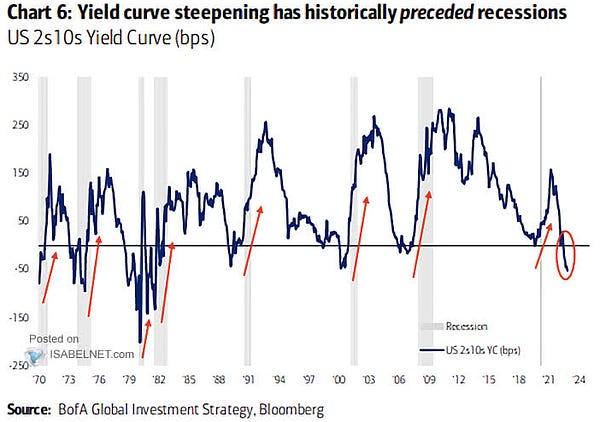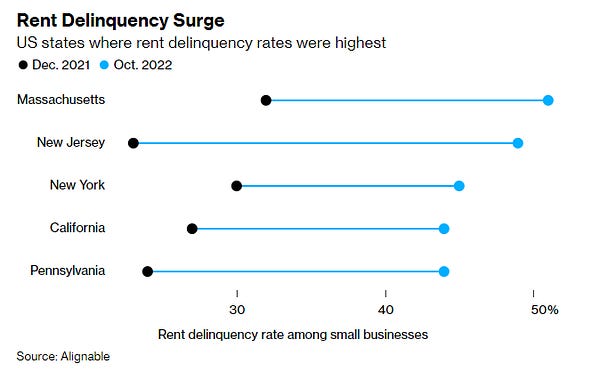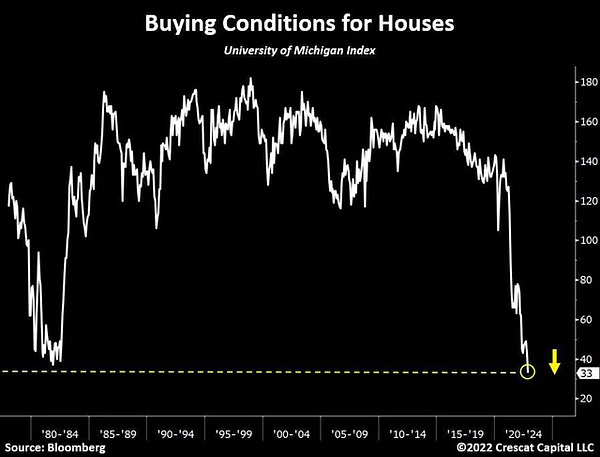Welcome to the "Patagonia vest recession"
Twitter is only one canary in this post-pandemic coal mine
I don’t know if it works this way for everyone, but when I just typed “Are we” into the Google search bar, it autofilled “in a recession.” Apparently I’m not the only one asking that question. The Federal Reserve is hoping to raise interest rates enough to slow inflation but not so much to slow economic growth so much that we go into a recession. Even though the definition of a recession is clear — a recession is two straight quarters in which economic activity declines — experts seem honestly unsure about whether the U.S. economy is in a recession.
The other morning on the first cold day of winter, I learned that we are in a recession. I was taking a walk with my friend SCG along the river that bisects Austin’s north and south halves. It was hat and gloves weather, but the sky was a brilliant blue marred only by overly fussy cirrus clouds. We were coming up to the break in the trees that line the trail where we got a great view of the office towers that had sprung up downtown, including the skyline-defining Google tower. It’s the one on the left in the photograph below. It’s shaped like a sail, with terraced gardens that turn the whole building green in the sun’s reflection. Sitting on the western edge of downtown and on the edge of the water, the Google tower looks like a giant mainsail powering Austin into the future.
And it has been completely empty since they finished it in July 2021.
That’s not all, SCG said. That unfinished tower with the crane sticking out from the top like a hunter raising a rifle at a dove was supposed to be the place where the company formerly known as Facebook was going to build the metaverse. I wrote about this like it was a done deal last January, and back then it was. The building, the tallest in Austin, “topped out” this month but is still empty. Meta now wants to sublease the space as part of its “ongoing rationalization of its office footprint.”
Stare at those buildings for a second while I think this through. In March 2020, we went through an economic Dunkirk and replatformed all of human interaction from offices and schools to screens. Then we got the jab and took off our masks, and the bosses told people to come back to the office. But some, especially in the tech industry, resisted, arguing that they had learned a new way to work. The tech companies built towers for a way of working that their own workers had innovated out of. Now, instead of housing thousands of information workers doing, I don’t know, things, they are empty buildings.
Google and Meta, two of the main engines of our economic growth, have put the truck in park and are trying to back up the trailer. There are two kinds of people who have backed up a vehicle towing a trailer: people who know how to do it and people who don’t and make a mess of things. Google and Meta have never had to back up, much less brake, and so those office towers sit empty in a supposedly recession-proof city, about as useless and awkward as a jackknifed pickup and boat trailer.
Months before it arrived, Scott Galloway has been calling this the “Patagonia vest recession.” Recessions hit different sectors harder than others. The COVID recession hit women hardest, and the Great Recession hurt the middle class more than anyone. This one is going to sting for those of us in the information economy.


In fact, it already has. In the dot-com recession of 2000-01, about 107,000 people lost their jobs in tech. Already, tech layoffs exceed 120,000, and it’s not just the ones you’d think, like the meme-stock lords at Robinhood, which cut its staff by 30%, or Lyft, which has never made a dime of profit and has now also lost 13% of its people. It’s also the muscle of the economy: Meta cut 13% of its workforce, and Intel cut 20%. Amazon, which had thrived during the dot-com recession, the Great Recession, and the COVID recession, is cutting 10,000 people.
How bad is the job market in tech? Recruiters are getting laid off. When the people in charge of hiring people are out of a job and looking to change industries, the magic 8 ball does not predict a quick turnaround.
What happens when thousands of tech bros are wandering the streets in their Patagonia vests? Well, they can’t afford rent anymore or need to sell their houses. When it comes to the former, we should all be seeing rent stabilizing if not edging down soon. But when it comes to buying houses, like Governor Robert Ritchie said in West Wing about the shooting death of a Secret Service agent, “Crime. Boy, I don’t know.”
Anything to increase housing supply has to be good for buyers, but with interest rates high and getting higher while consumer debt is skyrocketing, the market is shifting toward buyers when they are much less able to take advantage of it. And who would want to if interest rates mean you’re getting half the house you would have two years ago?
Besides, it’s not just tech bros who are hurting now. To paraphrase Mitt Romney — and frankly, it’s been too long that I’ve done so, and for that I apologize most abjectly with utmost sincerity — small businesses are people, my friend. And right now, they’re hurting. In October, a third of small businesses in the United States could not pay their rent.


It’s understandable that these canaries are yelling into the void while two of the most garish business stories in the history of commerce are taking place. More money has been lost in the cryptocurrency industry as the COVID relief bills passed in January 2021. Cryptocurrency might have been an obvious scam, but the investors put real money into it.

And then there’s Twitter. We underestimate the role that social media has in our economy. Remember when Starbucks spread o’er the land in the ‘90s, and suddenly we all went to coffee shops to hang out and work? Not only were we spending money there — think how common it is to see someone walk around holding a Starbucks-branded cup now — but people spent money to reach us there.
Social media companies are like that now. We go there to fart off as well as to work, and the biggest brands in the world, not to mention the small businesses in your town, spend money to reach us there. Now the platform that drives much of the national conversation has been taken over by someone who should have spent a chunk of his sizable inheritance on therapy, and it’s commanding all the attention. Elon Musk is doomscrolling Twitter in realtime, and I can’t look away. If the plane carrying the Baltimore Orioles crashed into a stadium where the Seattle Seahawks were playing against a team of zombie nuns, I would probably still be scrolling Twitter to find out the latest dumb thing Elon did, like firing the only guy who knows how to make cold brew coffee.
In fact, Elon’s “settle down, Beavis” management style has given the tech industry a lot of coverage. When the richest man in the world cuts 50,000 of the workers at a company and sells credibility at $8 a month, you’re probably not going to notice that Salesforce cut 2,000 jobs. This is the opposite of the Wizard of Oz. Pay all your attention to the man tearing down the curtains, and you’ll miss the fundamental shift in our economic life.
All destruction precedes growth. Anything will be possible except what was never possible to begin with, which was a return to a pre-pandemic normal. We are not out of the woods but still in, as Jennifer Palmieri points out in Dear Madam President, “a time of enormous upheaval. September 11, two wars, the Great Recession, enormous demographic changes, ever-growing economic inequality, a dramatic tech revolution, the digital economy, climate change.” What will we call this addition to that list? The Great Out of Office?
Our relationship with work will continue to evolve from the M-F, 9-5 office life to something new in which we can build culture within organizations without needing everyone to be in the same building at the same time. Ironically, the metaverse, which will probably fail for Meta, will be the means by which a remote worker in Kansas can work virtually alongside coworkers in Cleveland and have the meaningful, spontaneous interactions necessary for collaboration and creativity.
And here in Austin, we’ve got an election next month that will pick a new mayor, and that mayor will inherit a city where, for the first time since the ‘80s, there is a significant downward pressure on housing costs. Heck, they might even turn those empty office towers into affordable housing. The rent will no longer be too damn high, and while a lot of people are going to take a bath on selling houses, an equal number of people are going to get surprising deals. Thus, the new mayor will have solved the housing crisis. Congratulations in advance. I always knew you would succeed, whichever one you are.
Jason Stanford is the co-author of NYT-best selling Forget the Alamo: The Rise and Fall of an American Myth. His bylines have appeared in the Washington Post, Time, and Texas Monthly, among others. Follow him on Twitter @JasStanford.
Thanks to Noom, I lost 40 pounds over 2020-21 and have kept it off since then. Click on the blue box to get 20% off. Seriously, this works. No, this isn’t an ad. Yes, I really lost all that weight with Noom.
We set up a merch table in the back where you can get T-shirts, coffee mugs, and even tote bags now. Show the world that you’re part of The Experiment.
We’ve also got a tip jar, and I promise to waste every cent you give me on having fun, because writing this newsletter for you is some
Buy the book Texas Lt. Gov. Dan Patrick banned from the Bullock Texas History Museum: Forget the Alamo: The Rise and Fall of the American Myth by Bryan Burrough, Chris Tomlinson, and myself is out from Penguin Random House. Out in paperback now!






